Climate Science Denial Explained
Posted on 11 April 2018 by DPiepgrass
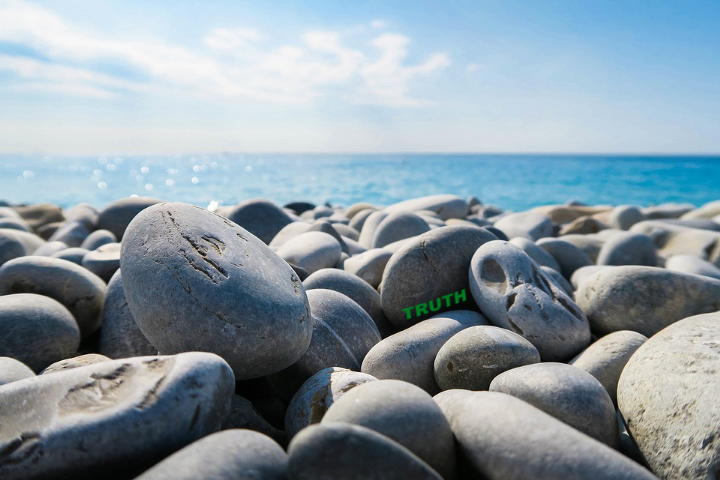
Lonnie Thompson, a climate scientist, was told by his doctor that he needed a heart transplant.
He denied it. “You’re crazy! I’ve been climbing the highest mountains in the world for…” he paused, mentally counted the decades.
Lonnie loved his job. He hiked up to mountain glaciers at 20,000 feet, to retrieve ice cores with the help of a solar-powered drill. He felt fine?—?it’s just asthma, he told himself?—?and as long as he needed a heart transplant, he wouldn’t be allowed to go on any more expeditions. Logically, then, his heart must be fine.
He fought his doctor for two years, and kept going on expeditions. Then while drilling in the Alps in 2011, he couldn’t get up from his tent. He couldn’t breathe. Luckily he was able to go down from the mountain, and return to the U.S. where he was admitted to an emergency room, and put on a heart pump.¹
Truth.
Truth has been a lifelong interest of mine: at first, to find out what the truth was, and then later, to figure out what techniques are useful for distinguishing truth from falsehoods.
My interest in questions of truth started with my religion. How can we be sure whether there is a God? If there is, why is it so hard to figure out which religion is true? If he exists, is He good? Would a good God behave the way we have observed? To me, these questions seemed staggeringly important, yet strangely neglected.
“Everyone is entitled to his own opinion, but not his own facts” - a quaint quote from a bygone era
Now my interest in truth has shifted, to the flows of misinformation and disinformation in society.
Last year I encountered a group on Facebook calling itself “Friends of Science”, buying ads with a simple message:
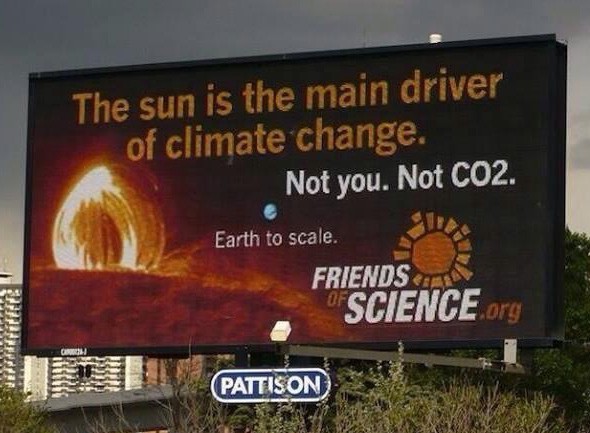
“CO2 does nothing. Why not buy another SUV?”
This led me to speak to a series of people who believe humans don’t cause (significant) global warming, to study climate science for over two months straight, to write anti-denial articles, and finally, to take a course in Global Warming Denial.
The Consensus
During a global cooling trend in the 1970s, climatologists came to a consensus of roughly 84% that CO2 was about to warm up the world. Today that consensus may be as high as 97%, at least among experienced climate scientists.
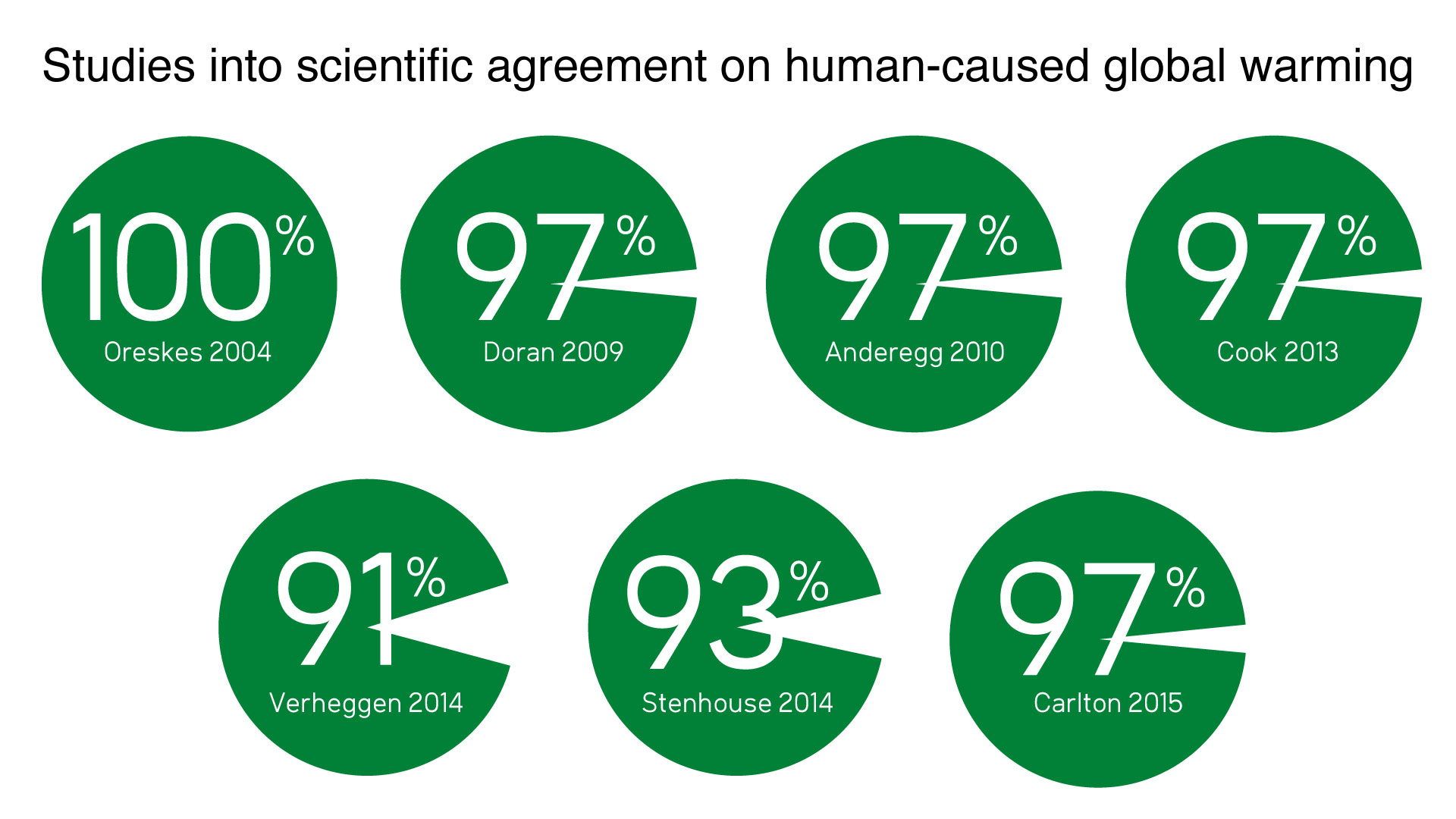
Consensus among expert climatologists. Consensus numbers are lower among novices and non-climate scientists.
“Skeptics” can easily brush those numbers aside using myths that “there’s not really a consensus”. Here are some typical arguments against the consensus:
- “the Doran 2009 study asked only 77 climate scientists if humans were a ‘significant’ contributing factor?—?any amount could be called significant”: well, other studies explicitly asked if humans caused “most” of the warming, or asked if humans cause at least half, or more than half of warming. Changing the question doesn’t lower the consensus very much, nor does asking more climate scientists of similar experience.
- “but there’s this petition of 31,000 scientists denying human-caused global warming…” yes, but only 0.1% of those who signed it are climate scientists. The only requirement to sign it is to be an American with a science or engineering degree. Only 0.44% of roughly 7.2 million people eligible to sign it have signed it, despite a mass-mailing campaign by the OISM, the scale of which has been kept secret.
- “in the Cook 2013 study, almost 2/3 of papers examined gave no opinion on AGW (man-made or ‘Anthropogenic’ Global Warming), so this consensus thing is a dishonest manipulation of data.” Why would every single paper have to express an opinion about that? 37% of abstracts since 1990 endorse AGW (at least implicitly) and 1% reject it (at least implicitly), and those numbers reflect a real consensus. Whether humans cause warming is not relevant in most climatology papers, so it need not be mentioned, and if a paper doesn’t express an opinion on AGW, it doesn’t mean the scientists who wrote it don’t have an opinion. In fact, often the same author publishes several papers, and only one of them indicates an opinion on human causation. For example, Cook’s study examined 5 papers by the contrarian Roy Spencer, and only one rejects AGW (and only implicitly, at that). The 3 papers by Lonnie Thompson (our heart-condition denier) are all classified as “No Position”, but his actual opinion is clear. If you don't like this study, look at other studies that gather scientists’ opinions directly. They show a clear consensus, too.
- “It’s just peer pressure”: surveys answered anonymously have similar results to surveys of public statements by climate scientists.
- “You have to agree with AGW or your funding will get cut off”: Almost 2/3 of climate science papers don’t express an opinion on human causation, so this argument doesn’t hold water; scientists can and do get funding without publicly addressing the causation question. Plus, contrarians are typically government-funded. It seems impossible to convince some people of what’s actually going on: to keep the funding going, you must be able to publish papers in a respectable journal, and to do that you must back up all claims with quantitative evidence, and use sound reasoning.
- “So what? global warming isn’t harmful”: Scientists disagree! In a Pew survey, 77% of “domain experts who are Earth scientists” say it is “a very serious problem” and another 17% say it is “somewhat serious”. Another study found that “41% of scientists believe global climate change will pose a very great danger to the earth in the next 50 to 100 years, compared to 13% who see relatively little danger. Another 44% rate climate change as moderately dangerous.”
People typically talk about “the study” on consensus, when in fact there have been numerous studies, all showing a consensus, generally above 90% (In “Talking to Climate Skeptics” I summarize most of the studies and give links to them). Academies of science in 80 countries endorse the consensus position. None reject it.
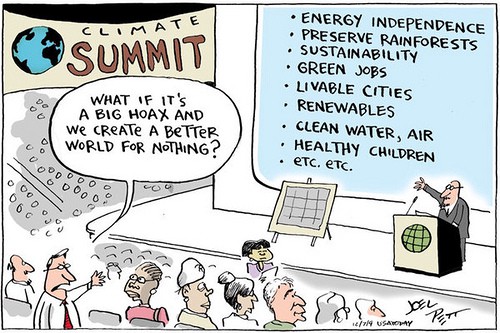
Telling doubters about the consensus (and dispelling anti-consensus myths) often helps them change their mind about global warming. It may also help to point out that dealing with climate change will improve the economy, that it doesn’t have to be expensive or difficult if everyone chips in a little, and that various Republicans support a carbon tax.
But I'm not here to write about doubters. This is about vocal “skeptics”.
You can explain all the above facts to a self-professed “skeptic” and it never changes their mind: they simply ignore you and/or move the goalposts. For instance, I was speaking with a guy who said he “agreed” with the consensus. I quoted consensus studies saying humans cause “most” of the observed warming, but as the discussion continued he repeatedly changed the word “most” to “some”, so he could keep saying he agreed with the consensus. After I repeatedly called him out for this, his new position was that climate scientists are all dishonest (initially he denied that this was his position, but later called them scumbags), and said that consensus studies prove climate science isn’t a real science. Why? He says “real” scientists don’t conduct surveys. Months later I caught him pretending to agree with the consensus once again.
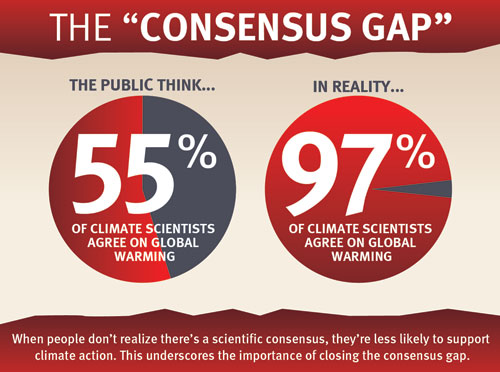
Once you’ve proven beyond any doubt that there is a consensus, their ultimate comfort is that “science isn’t done by consensus”.
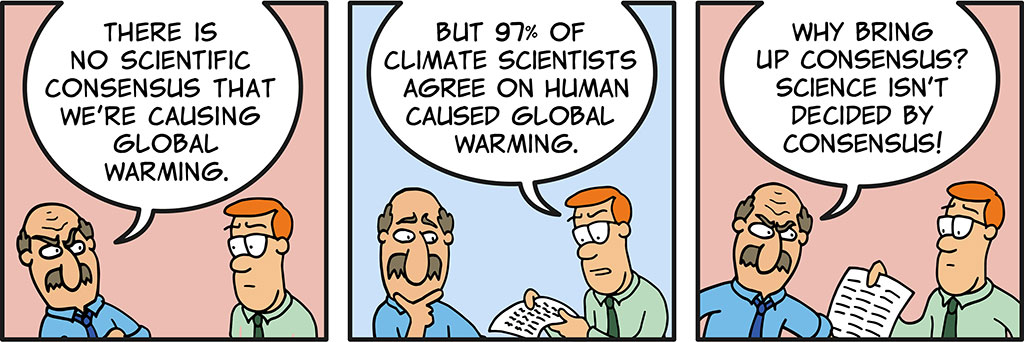
Since truth does not depend on anyone’s opinion, they figure their opinion about what is true outweighs thousands of climate scientists. For them, consensus scientists, no matter their country or background, are incompetent at best, and part of a global conspiracy at worst. For them, the only thing that makes a scientist credible is having the “right” opinions.
Denial101x
Denial 101x is an actual 6-week course about climate science, denial techniques and denial psychology, which you can take free online.
This 3-part series is basically “Denial101x for busy people”.
For a couple of months now I’ve had a personal goal of converting one of these guys. I wanted to know, “how much evidence does it take to convince them?” I learned to take a tactful and nonpolitical approach, with as much friendliness as I could muster?—?which often wasn’t that much, admittedly. After learning the science inside and out, and spending dozens of hours talking to specific people who deny AGW, the answer seems to be “It’s virtually impossible. Don’t bother.” While I talked to about a dozen of these guys, I worked harder on 6 of them. My final score: 1 out of 6. My one success story? A Canadian. And it wasn't 100% success. Just sorta-kinda.
Here’s what I’ve learned by talking to these guys:
They don’t like the word “denier” (and “denialist”)
You would think that “AGW denier” is a sensible shorthand for “person who denies human-caused (Anthropogenic) Global Warming is real, or a real problem”.
But getting offended whenever someone says “denier” is a smart strategy. Either they can force you to use the word they choose, which is “skeptic”, or they have an excuse to ignore your arguments, by claiming “denier” is a “slur” which makes you untrustworthy for saying it. (Despite this concern about labels, they still call mainstream climate scientists “alarmists”.)
The word “skeptic” is inaccurate, though, since their skepticism is selective. They were taught to be “skeptics” using a series of anti-science myths. They not only believe the myths, but when I try to debunk them, they often act as though I hadn’t said anything at all. Instead they change the subject or respond only to something else that I said. Real skeptics are evidence-driven, and do not simply ignore information that refutes their position.
“Science is not a democracy. It’s a dictatorship, and it’s the evidence that does the dictating” - John Reisman
Some have suggested other terms, such as “pseudo-skeptic” and “citizen scientist”. Originally this article used the term “denier”, but I’ve decided to switch the text to use “pseudo-skeptic” in an effort to increase neutrality. I’ve reserved the word “contrarian” for those rare individuals who have credentials in climate science, but still disagree with the consensus. (Edit: George Marshall suggests “dissenters”; others have suggested “dismissive”.)
It's a political debate dressed up as a science debate
Most Americans live in the Eastern U.S., which warmed less than the global average. This may help denial, but political beliefs matter far more.
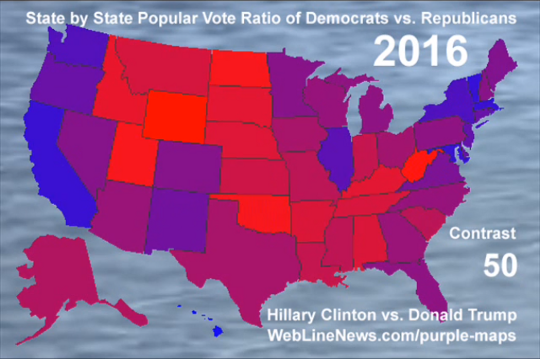 |
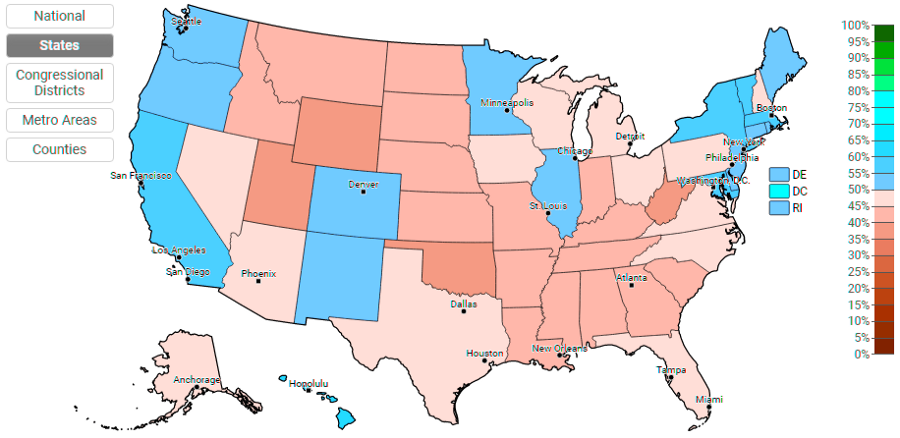 |
Left side in red: votes for Trump. Right side in brown: states where people do not believe “most scientists think global warming is happening”.
A Pew poll asks if “Earth is warming due mostly to human activity?” Only 15% of Republican voters agree (22% in another poll), compared to 79% of Democrat voters. It’s a testament to the power of propaganda on this issue that even Democrats show a lower consensus than climate science experts.
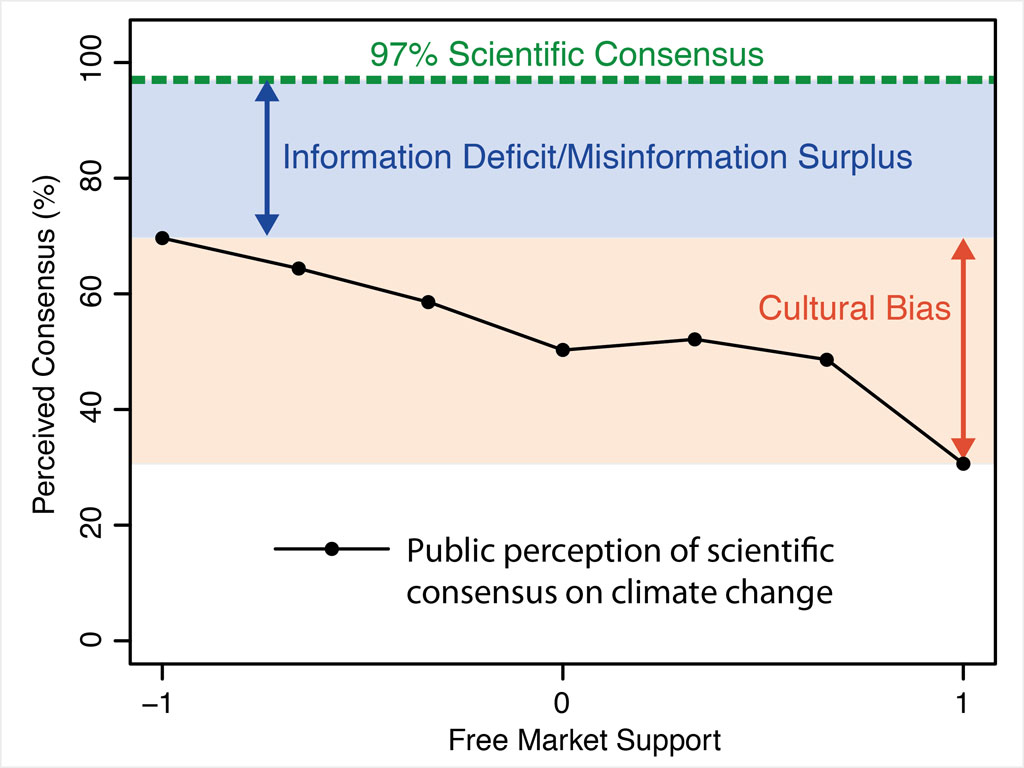
Graph by John Cook
The Denial Community
There are two climate scientists who publish contrarian blogs: Roy Spencer and Judith Curry, both American conservatives. The pseudo-skeptic community rallies around them as beacons of truth. Both of them want to minimize the appearance of human influence, but neither claim that there is no human influence.
Spencer wrote a book on free-market economics, and once said “I view my job a little like a legislator, supported by the taxpayer, to protect the interests of the taxpayer and to minimize the role of government”. Spencer emphasizes his own UAH dataset, which shows the smallest warming trend out of all available datasets (four different compilations of land and sea data by three countries, as well as weather balloons and RSS data, show more warming). Curry pushes an “uncertainty” angle?—?that we don’t know enough about what’s going on and climate scientists can’t be trusted to tell us. Pseudo-skeptics may combine such contrarian opinions with myths they’ve seen elsewhere to build a more complete story for themselves.
The tiny minority of credentialed contrarians are propped up by an enormous web of denial blogs written by non-climate scientists and non-scientists, such as “ClimateDepot” (by the Washington DC conservative outfit CFACT), the conservative Heartland Institute, WattsUpWithThat (headed by conservative TV meteorologist Anthony Watts), “RealClimateScience” (not to be confused with RealClimate.org, a blog by real climate scientists), NoTricksZone (with writers such as Kenneth Richard who I have examined before), Tony Heller (a longtime conspiracy theorist who used to go by the alias Steve Goddard), JoNova, and “Friends of Science”. Even publications like Washington Post and Forbes have published articles from professional pseudo-skeptics like James Taylor (Heartland Institute), and the New York Times recently hired conservative pseudo-skeptic Bret Stephens.
¹ Story adapted from a Denial101x interview































 Arguments
Arguments






























I think scepticism about new scientific theories among the public forms a continuum from people with a naive and instant acceptance of new theories, to people with mild healthy scepticism, to people with a rigid permanant denial.
You will convince mild sceptics with education, information, exposing the trikery of lobby groups, and showing that jobs lost in fossil fuels will be replaced with new jobs.
About 60% of Americans accept climate science. Given acceptance of other scientific theories can get to 90% or more it seems theres room to convince more people.
You wont change the core group of rigid denialists. Polls show its politically driven and thats hard to change. I would put their number at 10 - 20%. The best outcome would be to pressure the Republicans into accepting policies on renewable energy and revenue neutral carbon taxes.
To be a denialist is to indulge in an extreme form of cofirmation bias. But they do not see themselves as doing that. Many times I have seen them claim that they are just askink for empirical evidence that humans are causing dangerous climate changes. They genuinely do see themselves that way and cannot see the special pleading that they indulge in.
And then there is the claim by many of them that to call them denialists is to try to smear them by associating them with Holocaust denialists. This claim is self pitying and itself an attempt to smear critics of their behaviour. Again they cannot see how they appear to others.
You have to somehow get them to see what they are actually doing. But you are asking them to not only admit that they were mistaken but that they were doing was improper. And that is hard.
And I mean by indulge that they do not even try to weaken their confirmation bias.
Anyone wanting examples of extreme confirmation bias, follow "JeffDylan" (one of many sockpuppets that began as cosmowarrior as far as we know) and following sockpuppets on water vapour as a forcing starting here. You cannot help someone understand what they desparately do not want to understand.
Climate scientists are pretty upfront about what data would cause them to doubt their theories and change their mind. It would be nice if climate "skeptics" could do the same but either they want something that the science (if they read it) says is impossible (eg "temperatures rise every year because CO2 rises every year") or simply are so sure they are right, they cannot conceive of any observation that could change their mind.
I agree with all comments above that climate denialists score high with confirmation bias, but we are all at risk of confirmation bias to some extent. For example I like coffee and chocolate, so I hunt out research that finds benefits, and it takes me some effort to check research that shows problems, although I'm reasonably objective and disciplined compared to some people I know.
But why would some people exhibit 1) extreme confirmation bias and 2) only in the direction of climate denialism? Come on think it through.
The answer is the root cause of the confirmation bias with climate denialists has to be something and its mostly political ideology. Conservatives are more sceptical of the science for a range of reasons related to their deep seated instincts.
Read this article which sums up the political ideology and confirmation bias and how they relate.
Conservatives are possibly more susceptible to confirmation bias itself, but thats just a guess on my part. Its certainly not unique to any world view.
While its natural to look for supportive evidence, its important to try to train yourself out of confirmation bias getting out of control. Because if you get totally wedded to some belief its hard to back down as pointed out above.
Remember also that acceptance of the science is different from actually supporting changing energy systems to renewables and this is another area of potential scepticism, and while the two go together they dont always do this.
If you were say a signed-up Democrat, and someone asked "what arguments would convince you to become a Republican", chances are your real answer "nothing could make me become a Republican". That would be partly about identity and partly about values, neither of which change easily. Once a question gets polarized around identity and values, changing a mind becomes impossible. Its vitally important to recognize the difference between questions which are value based ("Should someone who commits a crime be punished for the sake of the victim") and those which are evidence-based. (eg "Is CO2 changing climate"?).
And dont forget that science is full of debates where people who should have had the critical analysis skills to do better, bitterly fought the evidence. "Science advances one funeral at a time".
I wonder what (some) deniers would think if confronted with evidence that they've been caught for suckers. Here for example is my paraphrase of a statement by Michael Burger, a law expert at the Sabin Center, in connection with a law suit against fossil-fuel companies:
These fossil-fuel companies knew. They knew that climate change was happening. They knew that continued fossil-fuel production and use was causing it. They knew that continued fossil-fuel production and use would only make it worse.
They knew this, but they hid it. And then they lied about it, and they paid other people to lie about it for them. All the while they profited from it and plotted to profit more. Ultimately, their actions caused harm, are continuing to cause harm, and are contributing to future harm.
Some deniers might change their mind if they knew this history. Of course, some are beyond persuading.
When someone you know comments that it is hot in his car after it has been sitting in the sun, point out that this is the greenhouse effect and that global warming is happening for a similar reason. Showing the mathematics behind a gallon of gasoline producing 19.5 pounds of CO2 can get people intrigued.
People who are not into science do not know the basics, They have no real reason to.
Unfortunately greenhouses (or hot cars) aren't ideal examples of the greenhouse effect, because a greenhouse works in part by trapping air so that it can't rise (and be replaced by cooler air that used to be higher in the atmosphere). The glass of a greenhouses also, incidentally, traps infrared radiation the same way greenhouse gases do, but it's easy for a pseudo-skeptic to point to the lack of convection and say "that's how a greenhouse really works - so the planetary greenhouse effect is a hoax."
If I catch someone denying the greenhouse effect, I just point out that most contrarian climate scientists (e.g. Roy Spencer, John Christy, Judith Curry) agree that the greenhouse effect exists. More learned pseudo-skeptics have all kinds of other arguments.
Has the following skeptical blog resourse been added to the misinforming list?
https://realclimatescience.com/
Hi All! First post here but I came across a blog (anti climate change blog) called What's Up With That by Anthony Watts who made a recent post trying to disprove NASA GISS chart.
Here is a blog post: https://wattsupwiththat.com/2023/03/12/new-wuwt-global-temperature-feature-anomaly-vs-real-world-temperature/
What do you all make of it? Curious to hear your thoughts. Thanks! :)
Foster:
Fortunately Dr. Inferno at the Denial Depot site wrote a summary of this issue way back in November 2010. How thngs never change! They just blow up the Y axis and say there is no change.
How To Cook A Graph SkepticalScience.com Style
He even has Skeptical Science in the title of the post!! (Dr. Inferno is a tounge in cheek satire site). Unfortunately, Dr. Inferno has not posted since 2016. If anyone knows who Dr Inferno is tell him that his fans are waiting his next post with eagerness.
This is my favorite graph (link to blog post explaining the tilted baseline) from Dr Inferno showing that Arctic Sea Ice is increasing. Monckton actually used a graph in a presentation that had a tilted baseline like this.
Foster @ 11:
I have not looked at anything over at WUWT in years, and I've never seen anyone post any information about what is available there to make it worth thinking that they have started posting anything even remotely connected to reality.
Perhaps you could put into your own words just what it is about that post that you think would give me a reason to look?
Someone who used to regularly debunk the crap from WUWT was Sou, over at her blog Hot Whopper. She has not been very active recently, but I just happened to take a look today. She has a new post up regarding GISS temperature data, etc. She does not specifically refer to WUWT, but perhaps you can read it and see if it answers your questions about the WUWT post. It may have been triggered by the recent WUWT post, or it may just be a coincidence in timing.
As Michael says, the world according to WUWT rarely changes. The bogosity is usually pretty predictable.
And I second the recommendation to Dr. Inferno's site. You need to be aware of Poe's Law before going there, though.
Correction. Sou's "recent" post is from a couple of months ago.
Foster @11 ,
Count me in ~ I, too, would love to know what virtues you see in that WattsUpWithThat blog article.
I confess to being a regular reader of WUWT blog ~ it has its amusing side, and despite WUWT 's prolific posts, it takes me little time to skim the daily avalanche (the trick is to skip through the rubbish). Most of the lead articles have a strong tinge of angry sourness & childishness. Rarely do I find an article containing some technical information of value.
And without scooping more than a ladle's worth of justified ad-hominems ~ I can say that the WUWT comments columns are even worse than the lead articles. The commenters do (in general) show a remarkable range of pathology . . . from scientific ignorance and delusional beliefs, through to extremist political axe-grinding. All wonderfully entertaining, if you have the stomach for it.
Foster, the WUWT article you mentioned has a humorous comment [about 4th from the top] by Nick Stokes , showing a graph depicting the change in the U.S. National Debt. Droll humor by Nick Stokes, exemplifying the absurdity of Anthony Watts's ideas. (Nick Stokes is always worth reading, for he is very rational & scientifically well-informed ~ he is the complete opposite of the Usual Denizens at WUWT. And they hate him for it ! )
[ The writer "Hot Sou" (mentioned @13 above) is pretty much banned at WUWT. She gets under Anthony Watts's skin ~ and IIRC he has threatened to take legal action against her. ]
Foster @11,
The crux of this latest nonsense from our chum Anthony Willard Watts is to plot out global average temperature using a very long Y-axis so it appears as a flat line.
This is rather reminiscent of the 'thin red line' of aging climate-change-denying climatologist Dickie Lindzen who would plot the size of AGW-to-date onto a graph of annual max-min temperatures in Boston (where he worked) using the width of a red line.
Lindzen would then make some nonsense statement about the planet's average temperature always wobbling by several tenths of a degree at virtually all timescales (which isn't correct). At a presentation in the UK Houses of Parliament back in 2012, he candidly put it thus:-
So this so-called climatologist suggests a global temperature change of twenty-times 'what he's seen so far' is when climate change becomes "remarkable". Call that 20 x 1.5ºF=+30ºF=+16ºC. I think the word "uninhabitable" would have been a more appropriate adjective.
Thank you all for summing up and explaining why that recent blog on WUWT post by Anthony Watts is just again, more misinfomration. I'm no climate scientists but I often come here to learn more, research and hear from you all as I'm well aware climate change is a major problem and love to hear thoughts as to how we can all help combat it. A higher
I feel like something needs to be done to stop denier sites and the spreading of misinformation as it relates to climate change. Thank you all again! I enjoy reading the comments and articles here and continue to be an active member here.
Foster @17 ,
I hope you found some amusement reading the Anthony Watts article. And reading maybe a few of its attached comments [best to look for ones with a high number of red-color "down votes"]. WUWT currently shows that article as having over 650 comments . . . a Platinum Medal score for a WUWT article, and demonstrating that it is doing well as a Hot Button issue for climate-denialists. Whew !
If you read the comments, you will see a lot of sniping & griping, but very little science at all.
As MA Rodger has touched on, you find prominent denialists such as Dr Lindzen and Dr Spencer who are driven by "motivated reasoning" derived from their emotional religious beliefs that the Divine Entity simply would not permit Earth's climate to depart from the comfortable Garden-of-Eden range.
However, most WUWT regular denialists fall into 3 groups :- the conspiritard/wingnut group ; the science crackpot group ; and the intelligent well-informed ones who neverthelesshave been captured by their own motivated reasoning (a sort of palace coup where emotions displace intellect). But obviously there is some overlap between groups ~ mostly the 1st and 3rd groups.
Foster , I would if I had my druthers, simply leave WUWT & similar sites to fester as they are. Yes, there is an argument that such disinformation sites ought to be "stopped". Undoubtably they deserve that fate. However, they may do more good than harm, by localizing denialists into their own echo chamber where they can blow off some steam . . . and it keeps them off the streets, so to speak.
eclectic @18,
I don't see Lindzen's opposition to the science as being motivated by religion. I see it as a scientist of some repute who lost the conclusive scientific debate over AGW in the 1980s but refused to admit defeat. While such stubbornness is not to be condemed (skepticism being a big part of the scientific process), Lindzen 'crosses the line' and sets out unscientific messages. I still remember his rather ludicrous contribution to the 1990 film 'The Greenhouse Conspiracy' (YouTube) which actually convinced me of the opposite view that AGW was real and likely a big problem being politically kicked into the long grass. (The 'crossing of the line' into non-science is not a wholly climate denier thing but they do seem to spend much more time doing it.)
Through the years, Lindzen did (indeed still does - see Lindzen & Choi 2022) continue work attempting to show that climate sensitivity is low and AGW not a problem for humanity, most famously his 'Iris Effect' which turns out to be a real effect but one having the opposite impact and one threatening significant increased warming.
MA Rodger @19 ,
there is much in what you say. And sadly, the Iris Effect was a flop. And Prof Lindzen's earlier predictions of only a very slight rise in surface temperature have been (in retrospect) a giant flop too.
I base my "religious" comment on seeing a lengthy video interview of Lindzen (dated around 2006, IIRC ). The interviewer was very simpatico ~ and Lindzen did not hold back.
Has my subsequent opinion of Lindzen been influenced by a confirmation-bias about his later public speakings ? . . . well, quite possibly so (but I do try to make allowance). A mountain of motivated reasoning on Lindzen's part still seems evident to me. As you yourself say, there is no logical basis for the denialist viewpoint.
Eclectic @20,
The other denier you mention, Spencer, has been described as mixing religion with his science (eg by The Christian Science Monitor). As for him doing actual science, I remember hearing his 2010 book 'The Great Global Warming Blunder: How Mother Nature Fooled the World's Top Climate Scientists' (thus implying he is not himself a 'top climate scientist') was published with the expectation that the paper presenting the scientific work underlying that grand title would be refused publication. However it was published but, I heard, it has been shown to exaggerated the effect he was proposing, an effect which does exist but as a very minor effect.
MA Rodger @21 ,
Yes, as I was addressing Foster @11 and @17 , it seemed reasonable to throw in mention of those two scientists who are "icons" of the science-denier crowd at WUWT .
As you know full well, Richard Lindzen and Roy Spencer are almost the only climate scientists having enough genuine track record in the field, as to qualify for worshipful attitude from the denialists. (In their desperation to find a respectable scientist who is "on our side" . . . the denialists are reduced to a choice of slim-to-none , compared with the many hundreds of mainstream climate scientists ~ or many thousands, depending on how defined.)
Dr Spencer's tendency is ( I gather secondhand from a Potholer54 video ) to take a religious fundamentalist viewpoint ~ to the effect that "all will be well with the Earth, thanks to divine protection". And Potholer54 relates how - over many years - Spencer has had to repeatedly backpedal from his climate assertions, as the contrary evidence keeps proving him wrong. Even so, at times Spencer gets a bit of flak from denizens at WUWT , because he is not quite politically-correct enough to deny Greenhouse Effect etc.
Both Lindzen and Spencer demonstrate how some well-informed & intelligent men can get it so very wrong, owing to a pigheaded "motivated reasoning" directed by the emotional part of their brain.